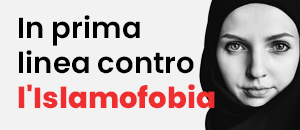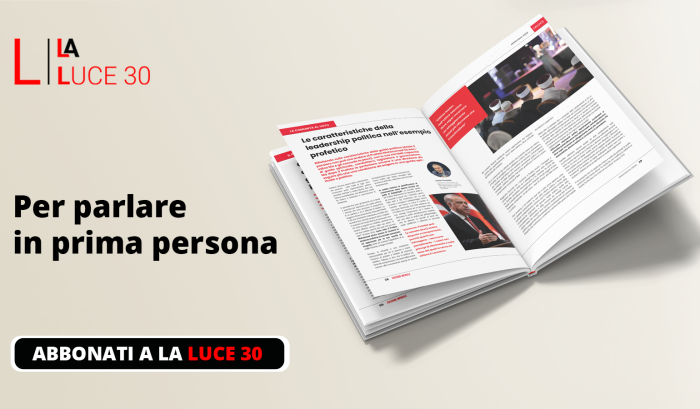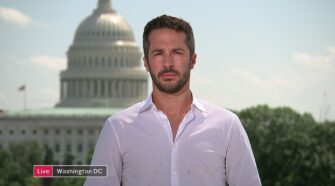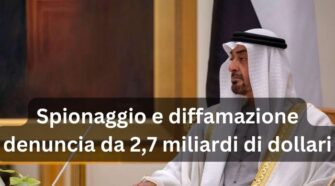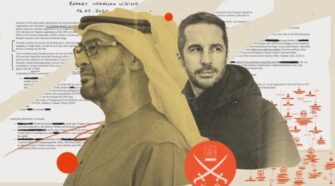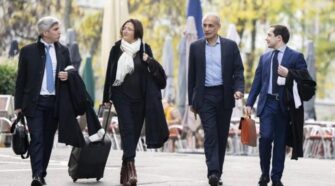To avoid being too imaginative, I have renamed it Emirati-gate. I’m talking about the scandal uncovered by the investigation carried out by the Pulitzer Prize winner David Kirckpatrick, published by The New Yorker (an American weekly newspaper), concerning the role of the Emirati intelligence service in Europe.
The investigation reveals in detail how the intelligence services working for Mohammed bin Zayed used a private Swiss intelligence agency to plan and implement an espionage campaign, dossier keeping and defamation against many Muslims and important Islamic organizations in Europe.
Therefore, this large operation, costing around six million of dollars, is particularly disturbing because it shows us how no one can reasonably think to be safe from this kind of attack by virtue of exemplary conduct.
Let me explain: this wasn’t a typical offensive campaign, based on threats, blackmail or physical violence, clearly identifiable actions that can be reported to the authorities, but neither was it a campaign that played on the skeletons in the closet of the victims.
This plot is so frightening because it shows that anyone can be destroyed through the planning and the expert circulation of a theorem. What is aimed at through these actions is something extremely valuable and extremely fragile at the same time: reputation.
The Islamic extremism theorem
A theorem is a statement that is logically demonstrated, however, from initial data called axioms or postulates, which are taken as true without any possibility of questioning them. It is therefore evident that if we accept certain initial information as true, the inevitable consequence will be that the conclusions too will be taken as true.
This is the main method used to undermine the life and development of Islamic communities in Europe in recent decades: targeting their organizations, their leaders, their institutions, and ultimately trying to destroy their public image.
If we still needed a confirmation, we had it: as many people continue to think, Islamophobia isn’t a physiological issue, or the result of a deep cultural background, or some anthropological incompatibility between the Western man and Islam, but rather a largely artificial phenomenon, created in a laboratory.
We’ve talked so many times about how 9/11 and the American strategy needed to destabilize and reshape the Middle East using ideological propaganda and a new monster to fight, identified in Islam. We know that this new approach permeated the societies of satellite countries in Europe and we know how every country, with a few honorable exceptions, has aligned with it. At the worst time, only a few intellectuals denounced the demonization of Muslims, from the intelligence services to the prosecution, from the media to the main parties.
But what we didn’t know was how, or through what mechanisms, this was happening. We were familiar with the dynamics of police and judicial theories through the incomparable investigative work of the lawyer Kamal Carlo Corbucci. In his book “Islamic Terrorism, Falsehood and Mystification” (Il Terrorismo islamico, falsità e mistificazione) Corbucci revealed how the repressive structures were often the executors of a very precise political agenda that had nothing to do with the search for truth and justice.
European repressive policies, the result of foreign interference
However, we didn’t know about the more subtle and opaque reality represented by the media and academic systems that are inextricably linked to policy makers. We undoubtedly had a feeling, an intuition and even something more. “I know but I have no proof,” wrote Pasolini, who defined himself as an intellectual and therefore able to put “together the disorganized and fragmentary pieces of a whole coherent political frame, which re-establishes logic where arbitrariness, madness and mystery seem to reign”.
Now, thanks to this investigation, we know (and we know that we weren’t far from the truth), even if we are often accused of conspiracy just for having imagined it.
Over the years, the Islamic community, its most prominent exponents and its organizations have been subjected to violent media campaigns always based on the theorem, always starting from the same assumptions. This investigation showed us that journalists were often paid huge amounts of money to write commissioned articles, it told us how the press was fed dossiers artfully packaged by the Emirati intelligence services to discredit their chosen targets.
How many times have we been involved in the middle of a media storm that condemned us without any evidence and without any possibility of appeal? Now we know how and why.
Much has been said about the Qatar-gate because it involved a few European MPs while this scandal involving the Emirates is passing over unnoticed but its extent is far greater and shows how extremely permeable are the European governments to the strategic objectives of foreign states, and, in this case, of the wealthy Gulf emirates.
Yes, because in this case external interferences have determined the planning and implementation of European governments’ public policies that in fact acted on behalf of foreign interests against their own citizens. This is certainly what happened in part in France, but the most striking case is Austria.
The investigation reveals that the ‘Operation Luxor’, carried out by the Austrian security forces in November 2020, was inspired by the theories of Lorenzo Vidino, researcher and advisor to the Kurz government.
On that occasion, around 70 homes of Muslim citizens were brutally searched by more than 900 police and special forces, on the basis that the state suspected the defendants to be terrorists and enemies of Austria. The raids targeted dozens of individuals, associations, companies and foundations. Assets and bank accounts totalling over EUR 20 million were frozen.
The theorem that Vidino has been promoting for years, also thanks to his role as director of the George Washington University’s Extremism Programme, essentially starts by tracing the contact points between the Muslim Brotherhood movement and violent extremism. On the basis of this assumption, he then argues that all Islamic organizations are inspired by the ideas of the Muslim Brotherhood, and that’s it: in just a few steps, all European Islamic organizations have been transformed into potentially destabilizing realities in the eyes of the institutions.
Today, we know that Lorenzo Vidino was (or perhaps still is) on the payroll of the intelligence services of the Arab Emirates who hired him through Alp Services. This makes Vidino more like an agent than an academic.
Could we reasonably think that Vidino’s is an isolated case? Reasonably not.
On the contrary, we must pay close attention to what comes out of academic circles about extremism and ‘radicalisation’.
In recent years, we have witnessed the proliferation of think tanks and observers that are anything but independent.
In Europe, this is true for the mosques that are directly promoted by the embassies of Arab countries, or for the scholars of so-called ‘moderate Islam’ in the pay of foreign powers whose main task is to legitimize the criminalisation of European Muslims who aren’t aligned with the policies of the regimes that feed them, and to impose themselves as privileged interlocutors of governments despite lacking any real representativeness.
Italian implications
Italy is not exempt from these effects: we need only to remember that in September 2016, the Renzi government set up the ‘Study Commission on the phenomenon of radicalisation and jihadist extremism in Italy’. Undersecretary Marco Minniti was responsible and continued to follow it even when Gentiloni arrived at Palazzo Chigi and he was promoted to the Viminale.
Lorenzo Vidino again chaired the commission, as he was identified by the government as the most authoritative and independent among the candidates. The many academics and journalists who were members of the commission, some of whom were very well connected to Italian Muslims, had nothing to say about it.
Muslim academics under fire
Europe’s Islamic communities have so far been unable to express an academic output capable of countering these kinds of attacks. In the academic circles there is obviously much mistrust against them, when not hostility, but there is also undoubtedly a lack of awareness among the Muslims themselves concerning the strategic importance of engagement in this regard.
It must be said that the very few independent Muslim scholars who managed to break through this wall and reach top academic institutions have been regularly persecuted. Two cases out of all: Farid Hafez and Tariq Ramadan, both mentioned in the New Yorker‘s investigation on Emirati-gate.
On 9 November 2020, as part of Operation Luxor, the Austrian police raided the home of Farid Hafez, a scholar at the University of Salzburg and Georgetown University. It was a real raid: the scholar described how the police pointed their guns at his chest while other officers in balaclavas broke into his house. That was the beginning of a judicial ordeal that ended only in January 2023 with the dropping of all charges against him.
Hafez is to blame for many reasons, including focusing his studies on the phenomenon of islamophobia and being one of the two editors of the Annual Report on Islamophobia in Europe.
Tariq Ramadan, a professor at Oxford and Europe’s leading Muslim intellectual, also has been targeted by the Emirati mud-slinging campaign. The files showed that Mario Brero, owner of Alp Services, proposed to the Emirati intelligence to destroy the Swiss academic by creating a sex scandal.
A few months later, French police began pursuing Ramadan until his preventive arrest in 2018, which lasted almost a year. Ramadan’s reputation was destroyed, Oxford suspended him, and although all accusations proved to be unfounded, Ramadan cannot leave France and his trial never began.
But we keep receiving blows without understanding where they come from because we are too focused on our community life. We don’t understand the reason for the attacks or even how they can happen. Often the reports on this matter are superficial and completely off base. Instead, it is imperative to be fully aware about the geopolitical context in which we are in because, willing or not, it has a huge influence on the present and the future of our communities and, ultimately, on our lives.
And, in concrete terms, it has an impact on our ability to establish places of worship, schools, Islamic financial institutions, etc. The type of context is what determines the possibility of not being discriminated against, of protecting our faith from media disinformation, of obtaining justice in the courts.
In general, the lesson to be learned from this is that investing in academic and intellectual research has priority strategic importance. Public policy feeds on research: those who hold knowledge, then they hold the monopoly in the narrative and affect the media discourse, influence the choices of law-makers and of governments, even going so far as to control the decisions of courts.
Thus, we have a clear representation of how the production of thought and knowledge can have an impact on the three powers and also on the so-called fourth.
Therefore, academic production, journalistic production, and presence in politics can no longer be postponed but must become a strategic imperative, as these are indispensable activities for the protection of the Muslim community and the safeguarding of the rule of law in European societies. If we continue to ignore this truth we will be exposed to new and even more serious consequences.

